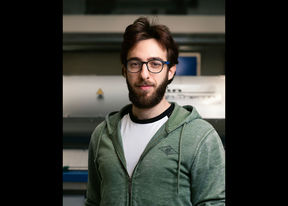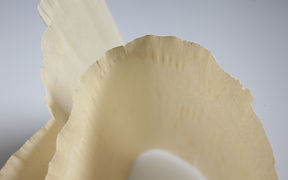Matteo Iannacchero, a developer of bio-based yarns: ‘I value the freedom of science’

Science has always fascinated Matteo Iannacchero. He particularly likes polymer chemistry for its practical nature.
‘My research is much more than just numbers. I can go to the lab, run some tests and touch the subject of my work. I am driven by curiosity and a desire to develop completely new kinds of materials’, says Iannacchero, who has completed a Master’s Degree in Industrial Chemistry at the University of Milan.
Iannacchero is completing his doctoral dissertation in the AIyarn project, the goal of which is to create biomaterial-based yarns for e-textiles. For example, yarns consisting of cellulose and virus particles can be used to introduce new functionalities into textiles.
‘The inorganic materials currently used in e-textiles are not only fragile but also uncomfortable to wear. We are developing bio-based polymer fibres that have properties similar to metals, such as conductivity and piezoelectricity.’
The multidisciplinary AIyarn project pilots the use of machine learning and artificial intelligence in the development of biomaterials. This opens up completely new opportunities for optimising materials and processes. Machine learning can unveil previously unseen correlations between the special characteristics and functional properties of materials, which aids in the discovery of new compounds.
‘The methods of machine learning help predict optimal reaction conditions, which can be used to provide the best desired properties for materials. All this will speed up the development of fibres and the optimisation of their properties.’
Freedom to innovate and make choices
Iannacchero is excited about research that leads him to new findings and discoveries.
‘This is not just about new materials, but also about completely new uses, from medical applications to fashion and textiles. For example, convertible fibres may change their shape when exposed to UV radiation, temperature changes or mechanical pressure.’
In his doctoral research, he is also inspired by researchers’ freedom.
‘I like the freedom of science and the fact that, as a researcher, I can make choices and influence the course of research. In the doctoral programme, we are encouraged to present our own ideas and think broadly.’
The Bioinnovation Center’s doctoral programme has several ongoing projects that not only bring together different disciplines but also students from different backgrounds. Iannacchero already has plans to implement textile prototypes using design competence in the AIyarn project.
After living in Finland for almost a year, Iannacchero has enjoyed his time in the country, and he is not worried about the cold of winter. Quite the contrary. In addition to an interesting topic for his doctoral dissertation, his move to Finland was motivated by his desire to move to a country colder than Italy.
‘I really like snow! In addition to hiking, my other passion is playing role games.’
Text: Marjukka Puolakka.
Aalto University Bioinnovation Center
To achieve human wellbeing in planetary boundaries, we need new sustainable solutions to wisely use our natural resources. The Bioinnovation Center especially focuses on innovations in sustainable bio-based materials, with special focus on textiles and packaging.

- Published:
- Updated:
Read more news

Call for two Assistant Professors in Computational Physics
The Department of Applied Physics at Aalto University School of Science invites applications for two Assistant professor positions in Computational Physics.
Auditor's expertise in climate risks affects the quality of the client's climate risk disclosures
The study was carried out in international cooperation with universities from several countries
Finland is strongly investing in AI and establishing an ELLIS Institute to accelerate research and attract talent
Public and private sector investment are coming together to launch ELLIS Institute Finland.